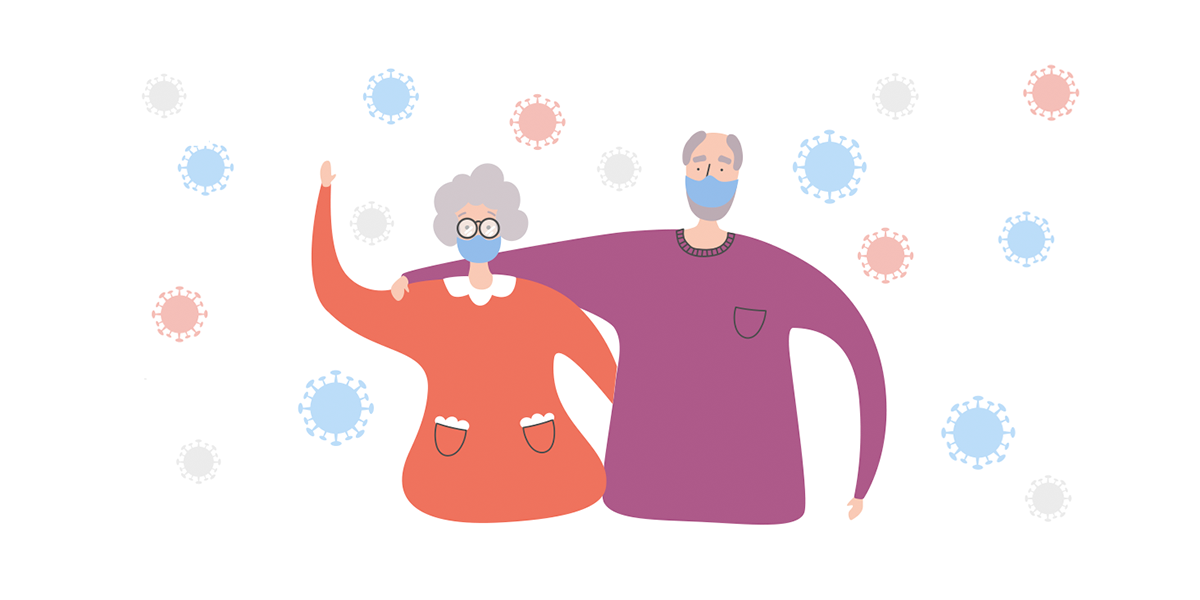Fostering healthy ageing
 It is important that older people are empowered to remain healthy during the COVID-19 pandemic
It is important that older people are empowered to remain healthy during the COVID-19 pandemic
COVID-19 has changed older people’s daily routines, the care and support they give and receive, their ability to stay socially connected, and how they are perceived. Older people are having to spend more time at home, physically distance themselves from other family members, friends and colleagues, temporarily cease all of their outdoor activities, and having to live in a state of anxiety and fear of illness and death – their own and others.
Although all age groups are at risk of contracting COVID-19, older persons risk bearing a disproportionate burden of the direct and indirect effects of the disease.
Here is why:
- An estimated 66% of people aged 70 and over have at least one underlying condition, placing them at increased risk of being severely impacted by COVID-19
- Old age in general is associated with lowered immunity and this may make them more susceptible to infections
- Older persons in quarantine or lockdown with family members or caregivers may face a higher risk of violence, abuse, and neglect
- With prolonged periods of quarantine/isolation, the mental health of older persons can be severely affected, especially if they face digital exclusion
- During COVID-19 older persons living in care homes and institutions globally have experienced a devastating impact on their lives, with distressing reports indicating rapid disease spread and instances of neglect or mistreatment.
It is important that older people are empowered to remain healthy during the COVID-19 pandemic. Such a proactive approach to support older people should consider the variety of demanding situations that older people find themselves in during the pandemic, their incredible resilience and positivity, and the multiple roles they play in society - as caregivers, volunteers and community leaders.
Source: United Nations Sustainable Development Group | WHO
Reducing COVID-19 risk for older people
The best way to protect older people from COVID-19 is for them to follow the simple steps in the image below:

What should older people consider before going out to a public space?
As communities and businesses begin to open, older people may be thinking about resuming some activities and running errands. There is no way to ensure zero risk of infection, so it is important to understand the risks and know how to be as safe as possible. Before deciding to go out, think of situations that could pose a greater risk of contracting the virus. Consider avoiding activities where physical distancing and other basic hygiene measures including wearing a face mask are difficult to follow.
Considering in-person visits with family and friends?
Ministry of Public Health, Qatar currently allows gatherings of up to 5 people indoors and 10 people outdoors. Here are some things for older people and their caregivers to consider to help make the visit as safe as possible:
- Delay or cancel visits if the hosts or guests have COVID-19 like symptoms or have been exposed to someone with COVID-19 in the last 14 days
- The more people we interact with, the closer the interaction, and the longer that interaction lasts - the higher the risk of COVID-19 spread. Think about:
- How many people will be there to interact with?
- Is it possible to keep a six-foot distance from others?
- Will the event be outdoors or indoors?
- What’s the length of time that interactions are likely to last?
- Try to avoid close contact with visitors. For example, don’t shake hands, elbow bump, or hug. Instead wave and verbally greet them
- If possible, avoid people who are not wearing face masks or ask people around you to wear face masks

Stay healthy during the COVID-19 pandemic
Staying healthy during the pandemic is important. Talking to healthcare providers and ensuring continuity of routine preventive and therapeutic care can help maintain good health.
- It is particularly important for older adults to receive recommended vaccinations against influenza and pneumococcal disease
- Ensure treatment for other chronic diseases continue uninterrupted
- Remember the importance of eating healthy, staying physically active and practicing healthy routines to cope with stress
Source: Centers for Disease Control
If you start feeling sick and think you may have COVID-19, call 16000.
Contributors: Ms. Yasmeen Kalverts, Ms. Raji Anand, Dr. Sohaila Cheema and Dr. Sathyanarayanan Doraiswamy
Editing: Mr. John Hayward